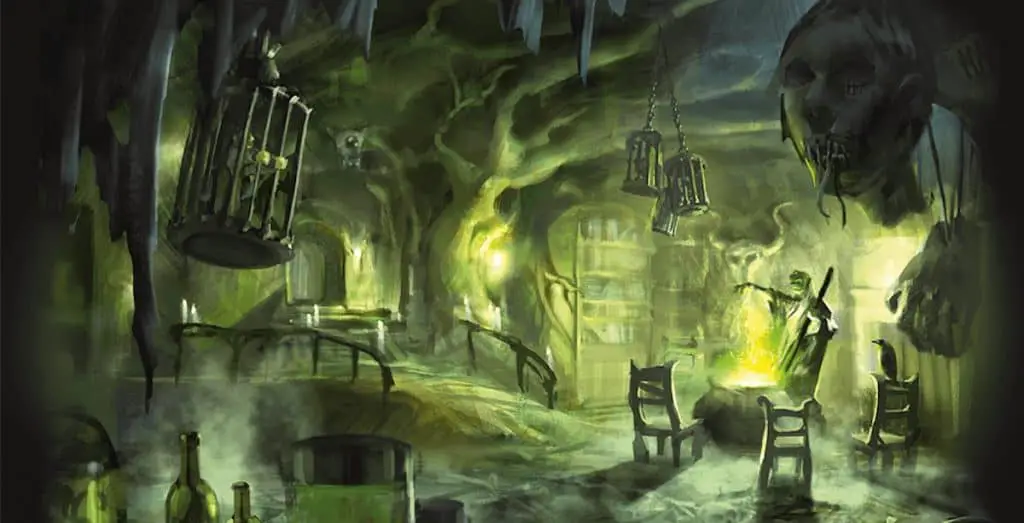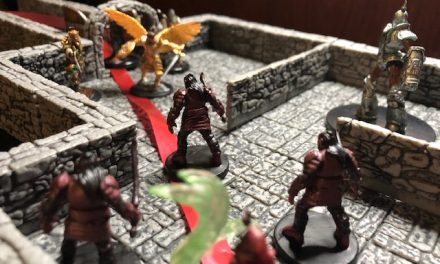Hags in D&D are known for many things. Spreading misery, diabolical schemes, and a love of all things foul are very much these creatures’ stock-in-trade.
But there is one tool in the Hag’s arsenal that gets used to disastrous effect: the infamous Hag Bargain.
Whether a bargain with a Hag is entered into out of greed, necessity, or a sense of the “greater good”, these arrangements have major consequences.
An entire subplot to a story can quickly revolve around escaping from a bargain with Hag. After all, no matter how tempting or fair the offer may seem at first, they are always, ultimately, one-sided.
With that said, let’s get right into it. It’s time for one of my most-requested articles!
This is all you need to know about Hag Bargains in D&D 5e!
What Warrants a Hag Bargain?
With ages of experience in manipulating and corrupting others, Hags have a strong understanding of how best to tempt to mortals into taking a bad deal.
They aren’t going to go door-to-door in some town offering deals with people. Rather, a Hag knows that a person coming to her puts her in a position of power. She starts the conversation with leverage and can use that to tilt the deal in her own favor as far as it can go.
A Hag is always looking for an opportunity to strike a deal rather than fight.
Generally speaking, there are four primary situations that warrant a Hag making a bargain.
Keep in mind, she will take full advantage of any information the PCs give her to further leverage her ability to “help” them in any of these situations. Of course, with more “help” there will be a higher cost!
This makes Hags one of my favorite creatures to include in any horror adventure. They greatly play on a lot of the themes that I covered in this Running Horror Games in D&D 5e Guide.

Case 1: The PCs Need Something from the Hag
This is the most direct method of encountering a Hag.
Let’s say that a deadly plague is spreading through a town. No cures have seemed to work and its spreading at an alarming rate. As the townspeople grow more desperate, someone suggests that the party speak with the old woman just past the town’s outskirts.
In this case, the PCs need something (a cure) directly from the Hag.
She will happily invite the party into her home to speak with her. Learning about the plague that is affecting the town, the Hag reveals that she just so happens to be in a position to help.
However, nothing in life is free…
(Of course, keep in mind that Hags are remarkably good manipulators who love creating and spreading as much misery as possible. It is entirely possible that the Hag, herself, caused the plague that the PCs are trying to find a cure for.)
Case 2: The PCs Need Something and the Hag Can Help
The second situation that could warrant a Hag bargain is if the Hag presents a type of shortcut.
Let’s return to our example of the plague spreading through the town.
The PCs learn that there is a rare flower growing atop a nearby mountain. This flower could be used by the town’s alchemist to craft a cure, but it’s very dangerous to climb the mountain.
Not only are there environmental hazards, but legends speak of a powerful creature that guards the mountain pass. Plenty of adventurers have tried to scale the mountain, but none have ever returned.
The PCs decide to brave this danger in order to save the town. However, they find themselves presented with an offer by a curious old woman.
The Hag is quick to reinforce the warnings of the danger ahead. She might even highlight that the journey will take precious time that the townspeople can’t afford to spare. Even if the PCs succeed on their quest to get the flower, it could very well be too late.
With that, the Hag offers her services… for a price…
How a Hag Might Offer a Shortcut
The Hag has focused on convincing the party that she alone can help them. Without her help, they are doomed.
She can give the PCs a magical item that will ward off the creature guarding the mountain as well as calm down the heavy winds that threaten to throw them off the mountain top.
On the other hand, she might even have the necessary materials in her home to craft a different cure.
Whatever the case may be, the Hag approaches the PCs offering a quicker solution to their problem. In these circumstances, she’s especially prone to being a little more passive in her negotiation terms.
She might claim to be helping the PCs “out of the goodness of her heart” or offer that “they can discuss payment afterwards.”
Either situation is a trap and a type of Faustian bargain. The Hag is betting that the PCs will take the deal and ultimately be forced to pay a heftier price later.
Of course, if the Hag is feeling particularly salty and the PCs don’t take her offer, she might choose to complicate the situation.
Using her magic to amplify the dangers on the party’s quest, she might hope that they will grow desperate and come back to her to take her up on the deal. Of course, now she has even more leverage and can greatly raise her price.

Case 3: The Hag Wants the PCs to Spare Her Life
Finally, we come to the third way that a Hag might be prompted to bargain with a party.
Hags are manipulators and schemers. While they’re certainly capable of holding their own in a fight, it is far from their preferred method of operating.
When the chips are down and the Hag doesn’t have a method of escaping, she will resort to the one thing that she knows above all else: bargaining.
The Hag knows that everyone wants something. By trying to quickly read the party members and offer them something to tempt them, the Hag aims to convince the party to spare her. She will absolutely play up the role of “helpless old woman” to generate sympathy if there’s even a chance that that will help.
The goal here is to prompt the party to pause. She’s not using her initiative to reveal what she can offer, she’s simply trying to convince them to stop attacking and converse.
Keep in mind, this is also part of how she is trying to regain control of the situation. Getting the party to say “yes” to having a conversation with her means that it’s more likely that they’ll say “yes” to a deal.
What do the PCs want?
Hags have a dark understanding of what makes mortals tick. They know how to manipulate others’ desires to suit their own needs.
The Hag should have something that fits that desire. In exchange for her life, the Hag can offer an item or enchantment for the party. She knows that she’ll have plenty of time to replace her possessions, but they’re useless if she is dead.
Have the Hag focus on the party member that she can most likely convince to spare her. If that person is inclined to take her deal, it starts to create discontent among the party. Now they’re questioning if they should spare her or not. Meanwhile, she can sweeten the deal as necessary to win over the majority of the party.
Such an arrangement may be a ploy to pass a cursed item onto the party, but only if the Hag is certain that she can be far away before the party learns about the curse. She isn’t going to risk them coming back again!
If she does feel that she can pull a quick one, however, the Hag will happily neglect to mention the downsides of a particular “gift” that she gives the party.
Case 4: The PCs want the Hag to Spare Their Lives
Similar to the previous example, a Hag may stand to gain much more by sparing the lives of a party that tried (unsuccessfully) to slay her.
Looking over the various Hags’ stat blocks, we see that they are particularly fond of using spells that disable their enemies. This is especially true if the party has decided to attack a coven who gets access to even more control spells like Polymorph and Eyebite!
To the Hag, it’s a waste to kill the whole party. Instead, they can offer a blatantly one-sided deal with a steep cost in exchange for the PCs’ lives. If they need to drive the point home, they might still choose to dispose of one or two party members in hopes of intimidating the survivors into taking the deal.
After all, there’s nothing quite like prolonged misery!
This can quickly lead to dangerous quests and evil deeds on behalf of the Hag. She’ll likely give the party some kind of debuffs as a type of “collar” that serves to discourage them from attacking her again in the future.
Of course, they will likely stay alert for any opening they can get to free themselves from the deal.
Like I said, a Hag deal can quickly turn into its own entire subplot within an adventure!

Types of Hag Bargains
Most Hag Bargains can be broken down into one of three categories based on what the Hag stands to gain.
Ultimately, a Hag’s motivations should be cruel, mysterious, or both. They are master schemers, after all, and a simple request may have major implications down the line.
Additionally, a Hag might disguise a curse as a benefit to further fool the party. While the Hag was able to cure the plague afflicting the village, it will keep coming back every few months. At that time, more negotiations will need to be had…
This-For-That
Most commonly, the Hag wants some kind of “thing” in exchange for her assistance.
The request might seem trivial. She might want a lock of hair from a beautiful girl in the nearby village, a single drop of blood from a powerful warrior, or some other such simple request.
More often than not, these simple requests are part in the larger “domino effect” that the Hag is scheming. Even the party agreeing to something as simple as delivering a bouquet of flowers to someone’s home could easily lead to catastrophic results.
However, the Hag may choose something more direct that has no real part in her larger schemes. To cause as much misery as possible, she might want to take something of extreme value from the PCs. She might want a Bard’s hands or musical talent, a Fighter’s coordination, or a Cleric’s faith.
These more extreme asks are generally reserved for when she has overwhelming leverage on the party in their negotiation. Unless it’s a situation where the party believes themselves to have no other choice, the Hag knows that she can’t get away with this.
However, if the party has come to the Hag out of desperation, she will seek to take all that she possibly can from them.
Information
Hags keep close eyes on all those within their domain. They love gossip and bringing a Hag news about some other powerful creature can be useful for gaining some level of favor with her.
This might be a dragon, genie, demon, or even a particularly noteworthy mortal. If the party is dealing with a Hag, they might find that (accurate and specific!) information also has value!
Of course, this means that the Hag has collected a great deal of information herself.
The party might not necessarily need or want some kind of physical boon that the Hag might have to offer.
Instead, she might know something about a particularly troublesome villain that the party has encountered. This could range from the villain’s lore to something more directly helpful like his weakness, fears, or even that he travels alone to an abandoned shrine in the forest every 14 days.
The Hag will have plenty of information that she can offer the party and will be eager to learn new information that might have escaped her thus far.
Owed Favor(s)
Of course, there is always the classic payment of a favor (or favors) to be called in at a later date.
Hags are very meticulous creatures who remember the exact terms of every deal they’ve ever made. It is virtually impossible to outwit a Hag, particularly when it comes to a deal that has already been struck.
She will never forget that you owe her a favor and will almost certainly call that favor in at the worst time possible.
You got a shiny magical item that you’re excited for? She wants it.
You have to hurry to a location to save the Princess? The Hag wants you to travel 5 days the opposite direction for something.
These favors can range from being an inconvenience to being a deadly trek into a dungeon to handle some of the Hag’s dirty work for her.
Clever Hags will often push for “owed favors” because they know that they can commonly get more value out of a “blank check” than they could from otherwise clear terms.

Negotiating Like a Hag
As a DM, having good roleplay is vital to getting the best use out of a Hag in your campaign.
As the party’s interaction with the Hag goes on, look for anything they say that the Hag can view as a way to gain leverage. The more they seem to want something, the higher price they’ll be willing to pay for it!
Hags are not nice creatures. They are foul in every sense of the word. Negotiating with a Hag should equally serve as a type of inquisition where the Hag wants to learn as much as possible about the party during their conversation. It should get uncomfortable very quickly.
I’ll commonly have a Hag caress a character’s cheek with her nasty fingernail or sniff them (complete with the Hannibal Lecter “slurp” sound effect) to make things even more tense.
Of course, the Hag is also trying to get the party focusing on striking a deal quickly to make the moment end. This means that they are less likely to consider all of the implications of what they are agreeing to.
The Power of “Yes”
In the example of needing a cure to save the village from a plague, have the Hag show the party the exact item that could be used as a cure. After all, without the Hag’s knowledge of how to use the item it’s worthless. The deal should quickly become something where all that the PCs have to do is say “yes” and they’ll get the item.
This is even easier if they have already said “yes” to a few other, simple things already.
“Would you like a chair?”
“You still have plenty of energy for your trip home?”
“Please shut the door behind you.”
These are all simple questions or requests. But the fact is that the more times they’ve said “yes” before the Hag’s offer, the more likely they are to accept it.
Fun fact: that’s actually an old sales trick!
You might be surprised how well it works. It’s part of why car salespeople will ask you if you want some water, if you mind waiting, or if you can join them to inspect your old vehicle. They want you to say “yes” to simple things because it makes it more likely that you’ll keep saying “yes” to their pitches.
Car dealership are run by Hags: confirmed.
Three Principles for Tempting Players
If nothing else, as a DM you want to factor in these three principles when tempting your players into a deal with a Hag.
Principle 1: The deal should be personal.
Whether it’s truly personal or not, the players should feel like everything hinges on this moment. If they don’t take the Hag’s deal, it’s like they are personally at fault for the plague that’s spreading in the village.
It should be a high-pressure moment.
Principle 2: It should be tense and uncomfortable.
The Hag won’t wait forever.
Don’t allow the party to get comfortable. Play up the terrible nature of her home and her off-putting behavior. They should want to get out of there ASAP. The sooner they agree to the Hag’s terms, the sooner they can leave.
Principle 3: Ignore Not the Rule of Yes
Have the players say “yes” to at least a few simple questions or requests.
This makes them more likely to quickly agree to a bad deal without attempting to negotiate the Hag down. This means that they may leave a lot on the table and be forced to come back later to negotiate a new (more costly) deal with the Hag.

Enforcing the Deal
Hag magic is entirely beyond the understanding of mortals. It doesn’t fit into any known laws of magic and even the greatest expert on Hags has no way of truly knowing what a particular Hag has up her sleeves.
Similarly, a Hag would never forget the terms of an agreement that was struck with her unless some truly extraordinary circumstances made it possible otherwise.
It can be safe to assume that the Hag is always watching a party that still owes her something. She might send grim reminders from time to time so that they don’t forget that she’s always there.
Have her tell them the consequences of breaking the contract when they go to agree to it. These should be severe.
Turning a player into seafoam, selling their soul to a fiend, or any other such terrible fate are well within the Hag’s powers.
You know what they say, “the large print giveth and the small print taketh away.”
Getting Out Of A Hag Bargain (Is It Possible?)
Getting out of a bargain with a Hag is remarkably difficult to do.
While Hags don’t operate exactly like devils (seeking to corrupt souls), their deals are similarly lengthy and filled with “gotcha” moments.
A Hag wants you to strike a deal in desperation because she knows that you won’t escape.
In general, there are three ways to get out of a Hag Bargain:
- Kill the Hag.
- Renegotiate.
- Complete the terms.
First things first, you can take the Hag head-on. Just keep in mind that she has very likely prepared for this and your group will almost certainly be at a major disadvantage.
Just be warned that she will also have the ability to bring incredible suffering upon the party. If she gets away, she will stop at nothing to bring the party to ruin.
You might instead attempt to renegotiate terms.
A Hag ultimately wants to spread misery and see others brought low as a result of their dealings with her. The only way that you might tempt the Hag is if there is something that you can give her that would end up resulting in more misery than keeping the current contract.
It’s a very long shot, but you might be able to make a case. Of course, this also puts you at fault for whatever the Hag chooses to do after that!
Lastly, you can complete the terms of the contract.
The Hag would have spelled out clear terms to the deal. She will do X and in exchange you will do Y.
If it’s an ongoing deal (such as giving her three favors to cash in whenever she chooses), you might find it easier to just see the original deal through to completion.

Some Examples of Hag Curses
Because Hag magic doesn’t fit the rules of “normal” magic, the sky is the limit when thinking of what kind of curses a Hag might inflict on a party.
I’ll include several examples here, but let me know in the comments if you’d like to see a larger collection of Hag curses!
Items
- Vertical Boots – Boots that make it easier for climbing, but will sink quickly if submerged in water.
- The Night Watchman’s Candle – A candle that can only be extinguished willingly by submerging it in water or snuffing it out with one’s fingers. It gives the ability to Scry on others, but must be extinguished after each use in this way. When extinguished, a random person will die.
- Vessel of Memories – A character can open the clay vessel and gain the memories of some powerful figure. However, one of their own memories are deposited. They have no recollection of the deposited memories afterwards.
- Replacement Mirror – A mirror that can trap a creature that looks into it in a pocket dimension as with a Banishment spell. In doing so, it releases another random creature.
- Chameleon’s Ribbon – A ribbon that gives a creature the ability to magically disguise themselves. Each time they use it, all of their personality traits are randomly changed.
Curses
- Last Breath – The character has 1 permanently “failed” death save as the Hag gets their last breath.
- Proficiency – The Hag takes a character’s talent. The character loses their proficiency in a skill of the Hag’s choosing.
- Madness – The character develops an Indefinite Madness from page 260 of the Dungeon Master’s guide.
- Hideous Appearance – The character begins to slowly take on a hideous appearance similar to that of the Hag.
- Marionettes – The Hag takes all of the character’s hair. Over time, she uses the hair to create doppelgangers of the character. These doppelgangers cause trouble and create a bad reputation for the character. They also serve as defenders for the Hag if need be.
- A Single Day – For one day a year, the character must come to the Hag’s home. The Hag will get to live as the character for that single day. (Note: time passes differently on other planes…)
Conclusion – Hag Bargains
As a DM roleplaying a Hag, you should absolutely play mind games with your PCs.
An interaction with a Hag can (and should!) have a major effect on the overall story. With new challenges presented by the deal or consequences for the party’s actions, a Hag can quickly become a constant thorn in the party’s side.
On the same note, the more involved the party gets with a Hag, the more difficult it should seem to pin her down. Hags are very gifted manipulators and will consistently be several moves ahead of the party.
If you want to learn more about Hags, they were actually the very first featured monster on this blog! You can check that article out here!
This article ended up being WAY bigger than I expected, but I wanted to be as thorough as possible when covering the method and mindset necessary to use Hag Bargains to their best effect in D&D.
Got more Hag questions or a particularly nasty Hag encounter you want to share?
Let’s talk in the comments!









